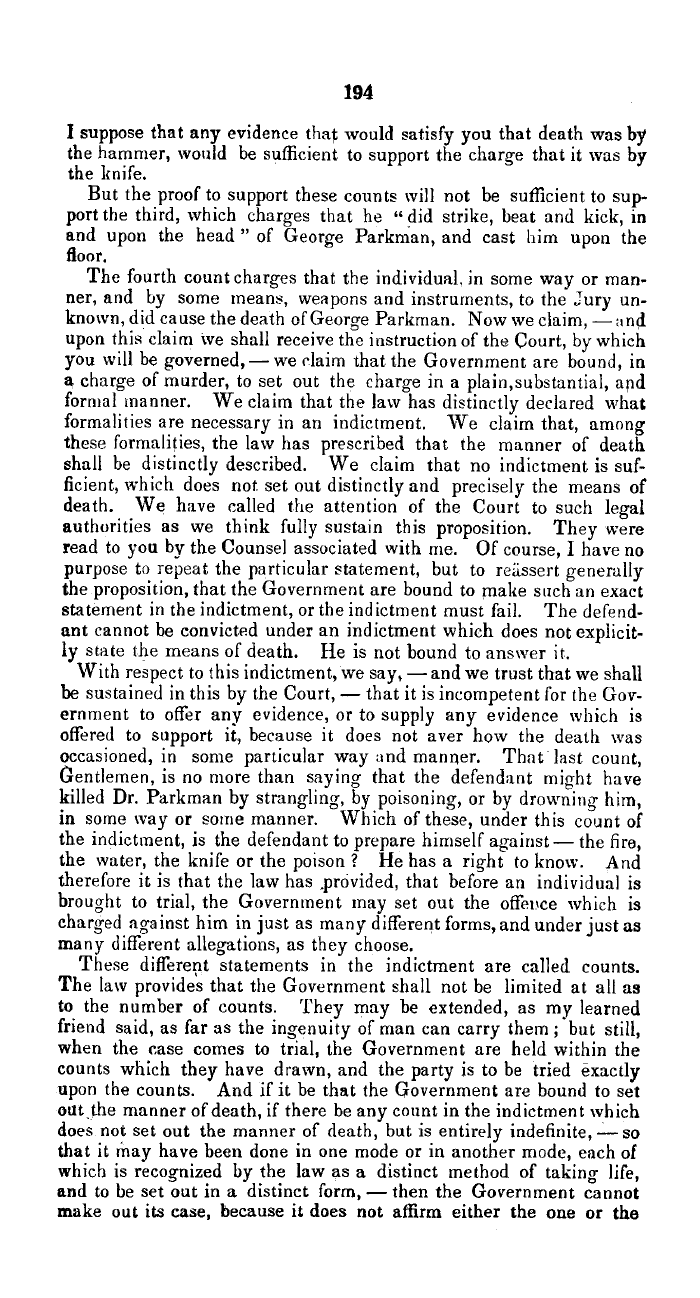|
191
I suppose that any evidence that would satisfy you that death was by
the hammer, would be sufficient to support the charge that it was by
the knife.
But the proof to support these counts will not be sufficient to sup-
port the third, which charges that he °' did strike, beat and kick, in
and upon the head " of George Parkman, and cast him upon the
floor.
The fourth count charges that the individual, in some way or man-
ner, and by some means, weapons and instruments, to the Jury un-
known, did cause the death of George Parkman. Now we claim, -and
upon this claim we shall receive the instruction of the Court, by which
you will be governed,-we claim that the Government are bound, in
a charge of murder, to set out the charge in a plain,substantial, and
formal manner. We claim that the law has distinctly declared what
formalities are necessary in an indictment. We claim that, among
these formalities, the law has prescribed that the manner of death
shall be distinctly described. We claim that no indictment is suf-
ficient, which does not set out distinctly and precisely the means of
death. We have called the attention of the Court to such legal
authorities as we think fully sustain this proposition. They were
read to you by the Counsel associated with me. Of course, I have no
purpose to repeat the particular statement, but to reassert generally
the proposition, that the Government are bound to make such an exact
statement in the indictment, or the indictment must fail. The defend-
ant cannot be convicted under an indictment which does not explicit-
ly state the means of death. He is not bound to answer it.
With respect to this indictment, we say, -and we trust that we shall
be sustained in this by the Court, - that it is incompetent for the Gov-
ernment to offer any evidence, or to supply any evidence which is
offered to support it, because it does not aver how the death was
occasioned, in some particular way and manner. That last count,
Gentlemen is no more than saying that the defendant might have
killed Dr. Parkman by strangling, by poisoning, or by drowning him,
in some way or some manner. Which of these, under this count of
the indictment, is the defendant to prepare himself against-the fire,
the water, the knife or the poison ? He has a right to know. And
therefore it is that the law has ,provided, that. before an individual is
brought to trial, the Government may set out the offence which is
charged against him in just as many different forms, and under just as
many different allegations, as they choose.
These different statements in the indictment are called counts.
The law provides that the Government shall not be limited at all as
to the number of counts. They may be extended, as my learned
friend said, as far as the ingenuity of man can carry them ; but still,
when the case comes to trial, the Government are held within the
counts which they have drawn, and the party is to be tried exactly
upon the counts. And if it be that the Government are bound to set
out _the manner of death, if there be any count in the indictment which
does not set out the manner of death, but is entirely indefinite, - so
that it may have been done in one mode or in another mode, each of
which is recognized by the law as a distinct method of taking life,
and to be set out in a distinct form,-then the Government cannot
make out its case, because it does not affirm either the one or the
|

